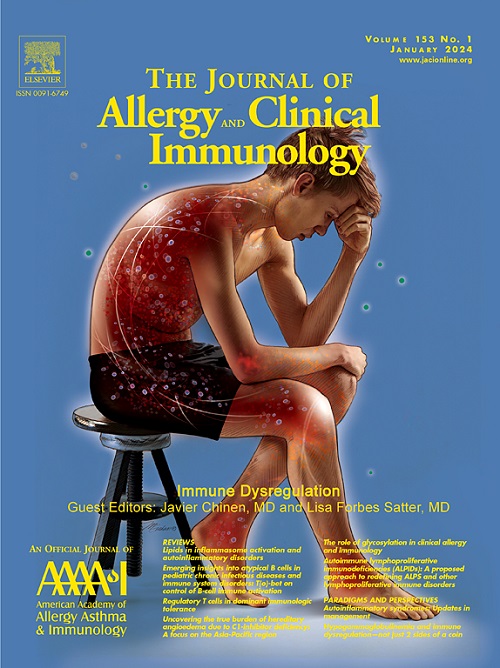生物制剂治疗慢性鼻窦炎伴鼻息肉的临床疗效及机制探讨。
IF 11.4
1区 医学
Q1 ALLERGY
引用次数: 0
摘要
慢性鼻窦炎伴鼻息肉(CRSwNP)的治疗具有挑战性,特别是当标准治疗包括鼻内皮质类固醇和内窥镜鼻窦手术不能充分控制症状时。CRSwNP通常以2型免疫特征为特征,许多患者还伴有其他合并症,包括哮喘。目前有三种生物疗法被批准用于治疗CRSwNP-omalizumab, mepolizumab和dupilumab-并且有前景的疗法正在开发中。生物治疗可改善CRSwNP患者的生活质量,减少全身皮质类固醇治疗和内窥镜鼻窦手术的需要,并改善合并症的治疗。评估生物疗法如何改变CRSwNP炎症的转化研究使我们对CRSwNP的发病机制有了更深入的了解。在此,我们将回顾CRSwNP临床试验和现实世界中有关生物制剂的有效性和安全性的数据,讨论其治疗机制,评估生物治疗与内窥镜鼻窦手术的结果,并讨论治疗的发展和未来方向。本文章由计算机程序翻译,如有差异,请以英文原文为准。
Clinical efficacy and mechanisms of biologics for chronic rhinosinusitis with nasal polyps
The management of chronic rhinosinusitis with nasal polyps (CRSwNP) can be challenging, particularly when standard treatments including intranasal corticosteroids and endoscopic sinus surgery do not result in adequate symptom control. CRSwNP is frequently characterized by a type 2 immune signature, and many patients have other comorbid type 2 conditions, including asthma. There are currently 3 biologic therapies approved for the treatment of CRSwNP—omalizumab, mepolizumab, and dupilumab—and there are promising therapies in development. Biologic therapies allow for improved patient quality of life in CRSwNP, reduction in need for systemic corticosteroid treatment and endoscopic sinus surgery, and improvement in treatment of comorbidities. Translational studies assessing how biologic therapies can modify inflammation in CRSwNP have allowed for a greater understanding of CRSwNP pathogenesis. We review CRSwNP clinical trial and real-world data on the effectiveness and safety of biologics, discuss their therapeutic mechanisms, assess outcomes of biologic therapy versus endoscopic sinus surgery, and discuss therapies in development and future directions.
求助全文
通过发布文献求助,成功后即可免费获取论文全文。
去求助
来源期刊
CiteScore
25.90
自引率
7.70%
发文量
1302
审稿时长
38 days
期刊介绍:
The Journal of Allergy and Clinical Immunology is a prestigious publication that features groundbreaking research in the fields of Allergy, Asthma, and Immunology. This influential journal publishes high-impact research papers that explore various topics, including asthma, food allergy, allergic rhinitis, atopic dermatitis, primary immune deficiencies, occupational and environmental allergy, and other allergic and immunologic diseases. The articles not only report on clinical trials and mechanistic studies but also provide insights into novel therapies, underlying mechanisms, and important discoveries that contribute to our understanding of these diseases. By sharing this valuable information, the journal aims to enhance the diagnosis and management of patients in the future.

 求助内容:
求助内容: 应助结果提醒方式:
应助结果提醒方式:


